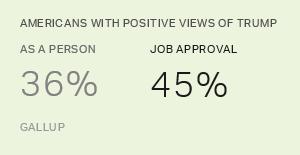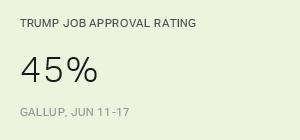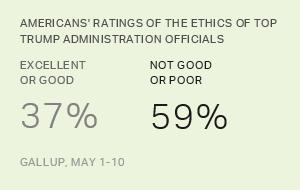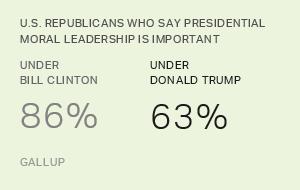Story Highlights
- Nine-point gap between job approval and image as a person
- Republicans, Democrats mostly consistent in their views of Trump
- Bill Clinton had 32-point gap on the same two measures in 1999
WASHINGTON, D.C. -- Thirty-six percent of U.S. adults have a positive image of Donald Trump "as a person," while 55% have a negative opinion of him. Nearly three-quarters of Republicans view Trump positively as a person while only 7% of Democrats do.
| Positive | Negative | No opinion | |||||||||||||||||||||||||||||||||||||||||||||||||||||||||||||||||||||||||||||||||||||||||||||||||
|---|---|---|---|---|---|---|---|---|---|---|---|---|---|---|---|---|---|---|---|---|---|---|---|---|---|---|---|---|---|---|---|---|---|---|---|---|---|---|---|---|---|---|---|---|---|---|---|---|---|---|---|---|---|---|---|---|---|---|---|---|---|---|---|---|---|---|---|---|---|---|---|---|---|---|---|---|---|---|---|---|---|---|---|---|---|---|---|---|---|---|---|---|---|---|---|---|---|---|---|
| % | % | % | |||||||||||||||||||||||||||||||||||||||||||||||||||||||||||||||||||||||||||||||||||||||||||||||||
| U.S. adults | 36 | 55 | 10 | ||||||||||||||||||||||||||||||||||||||||||||||||||||||||||||||||||||||||||||||||||||||||||||||||
| Republicans | 73 | 20 | 7 | ||||||||||||||||||||||||||||||||||||||||||||||||||||||||||||||||||||||||||||||||||||||||||||||||
| Independents | 31 | 55 | 13 | ||||||||||||||||||||||||||||||||||||||||||||||||||||||||||||||||||||||||||||||||||||||||||||||||
| Democrats | 7 | 88 | 5 | ||||||||||||||||||||||||||||||||||||||||||||||||||||||||||||||||||||||||||||||||||||||||||||||||
| Gallup, June 11-17, 2018 | |||||||||||||||||||||||||||||||||||||||||||||||||||||||||||||||||||||||||||||||||||||||||||||||||||
These results are based on June 11-17 Gallup polling. At the same time, Trump's job approval rating was 45%.
Trump won the election despite being the least popular presidential candidate in recent memory. His tenure has been plagued by controversy over his policy actions and an investigation into whether his campaign colluded with the Russian government. He has launched high-profile attacks on Washington officials of both parties, including members of his own cabinet. But Trump has presided over the nation at a time when unemployment is at a historically low rate and the stock market has reached record highs, and he has engaged in talks with long-term U.S. enemy North Korea aimed at eliminating its nuclear weapons. All of these factors may influence how people view Trump from a professional perspective and a personal perspective.
The relatively narrow nine-percentage-point gap between Trump's job performance and personal character ratings (45% to 36%) indicates that most Americans do not make much distinction between the two.
Overall, 81% of Americans hold consistent opinions of Trump across the two dimensions -- either approving of the job he is doing and having a positive opinion of him, personally (34%), or disapproving of the job he is doing and having a negative image of him (47%).
Ten percent of U.S adults do make distinctions, including 8% who approve of the job he is doing but view him negatively as a person and 2% who disapprove of the job he is doing but have a positive opinion of him personally.
The remaining 9% did not offer an opinion on either Trump's job performance or their image of him.
Among party groups, Democrats are most likely to have consistent views of Trump -- 89% do -- with the vast majority disapproving of Trump's performance and viewing him negatively. Eighty percent of Republicans' opinions on Trump's job and personal qualities are in alignment, with 72% having positive opinions about both. Meanwhile, 13% of Republicans are conflicted about Trump, with 12% approving of how he is handling his job but disliking him personally.
Three-quarters of independents have consistent opinions about Trump, with many more holding negative opinions (47%) than positive ones (30%).
| U.S. Adults | Republicans | Independents | Democrats | ||||||||||||||||||||||||||||||||||||||||||||||||||||||||||||||||||||||||||||||||||||||||||||||||
|---|---|---|---|---|---|---|---|---|---|---|---|---|---|---|---|---|---|---|---|---|---|---|---|---|---|---|---|---|---|---|---|---|---|---|---|---|---|---|---|---|---|---|---|---|---|---|---|---|---|---|---|---|---|---|---|---|---|---|---|---|---|---|---|---|---|---|---|---|---|---|---|---|---|---|---|---|---|---|---|---|---|---|---|---|---|---|---|---|---|---|---|---|---|---|---|---|---|---|---|
| % | % | % | % | ||||||||||||||||||||||||||||||||||||||||||||||||||||||||||||||||||||||||||||||||||||||||||||||||
| Approve of job, positive view of him | 34 | 72 | 30 | 5 | |||||||||||||||||||||||||||||||||||||||||||||||||||||||||||||||||||||||||||||||||||||||||||||||
| Approve of job, negative view of him | 8 | 12 | 8 | 5 | |||||||||||||||||||||||||||||||||||||||||||||||||||||||||||||||||||||||||||||||||||||||||||||||
| Disapprove of job, positive view of him | 2 | 1 | 3 | 2 | |||||||||||||||||||||||||||||||||||||||||||||||||||||||||||||||||||||||||||||||||||||||||||||||
| Disapprove of job, negative view of him | 47 | 8 | 47 | 84 | |||||||||||||||||||||||||||||||||||||||||||||||||||||||||||||||||||||||||||||||||||||||||||||||
| No opinion on at least one dimension | 9 | 7 | 12 | 5 | |||||||||||||||||||||||||||||||||||||||||||||||||||||||||||||||||||||||||||||||||||||||||||||||
| Total with consistent opinions | 81 | 80 | 77 | 89 | |||||||||||||||||||||||||||||||||||||||||||||||||||||||||||||||||||||||||||||||||||||||||||||||
| Total with inconsistent opinions | 10 | 13 | 11 | 7 | |||||||||||||||||||||||||||||||||||||||||||||||||||||||||||||||||||||||||||||||||||||||||||||||
| Gallup, June 11-17, 2018 | |||||||||||||||||||||||||||||||||||||||||||||||||||||||||||||||||||||||||||||||||||||||||||||||||||
Americans Much More Likely to Render Split Verdict on Clinton in 1999
Gallup also asked Americans to evaluate Bill Clinton as a president and as a person on multiple occasions between September 1998 and March 1999. That spanned the time between the release of independent prosecutor Kenneth Starr's investigation of Clinton's actions in the Paula Jones and Monica Lewinsky matter and Clinton's being acquitted on impeachment charges by the Senate.
During this time, an average of 40% of Americans had a positive view of Clinton as a person while 66% approved of the job he was doing as president. The gap between Clinton's presidential and personal ratings is thus nearly three times as large as the gap seen for Trump today, almost entirely because of Clinton's higher job approval ratings. Americans were much more likely to make distinctions between Clinton's professional and personal lives than they are about Trump.
Clinton's job approval ratings were likely high because of the economic boom the country was experiencing, which resulted in a few years of budget surpluses rather than deficits. Also, Americans sided with Clinton over the Republicans in Congress as to whether he should be impeached.
In a March 1999 poll, taken about a month after the Senate acquitted Clinton, which was the last time Gallup asked the pair of questions about Clinton, his job approval rating was 68%. In that survey, 36% had a positive view of Clinton as a person, the same percentage as Trump today.
Differences in personal views of the president among his fellow partisans account for much of the gap. In 1999, 58% of Democrats said they had a positive opinion of Clinton as a person, compared with 73% of Republicans saying the same about Trump.
Back then, six in 10 Americans had consistent views of Clinton, including 33% who were positive about him as a person and a president and 27% who were negative. But nearly one in three Americans, 31%, approved of the job Clinton was doing but viewed him negatively as a person.
Just over half of Democrats, 56%, had positive opinions of Clinton on both dimensions, and the same percentage of Republicans were negative about Clinton on both. Those figures compare with the 72% of Republicans who are positive about Trump, and the 80% of Democrats negative about him, on the same two ratings.
In 1999, independents were most likely to approve of the job Clinton was doing but view him negatively as a person, with 36% holding those opinions.
| U.S. Adults | Republicans | Independents | Democrats | ||||||||||||||||||||||||||||||||||||||||||||||||||||||||||||||||||||||||||||||||||||||||||||||||
|---|---|---|---|---|---|---|---|---|---|---|---|---|---|---|---|---|---|---|---|---|---|---|---|---|---|---|---|---|---|---|---|---|---|---|---|---|---|---|---|---|---|---|---|---|---|---|---|---|---|---|---|---|---|---|---|---|---|---|---|---|---|---|---|---|---|---|---|---|---|---|---|---|---|---|---|---|---|---|---|---|---|---|---|---|---|---|---|---|---|---|---|---|---|---|---|---|---|---|---|
| % | % | % | % | ||||||||||||||||||||||||||||||||||||||||||||||||||||||||||||||||||||||||||||||||||||||||||||||||
| Approve of job, positive view of him | 33 | 11 | 29 | 56 | |||||||||||||||||||||||||||||||||||||||||||||||||||||||||||||||||||||||||||||||||||||||||||||||
| Approve of job, negative view of him | 31 | 23 | 36 | 31 | |||||||||||||||||||||||||||||||||||||||||||||||||||||||||||||||||||||||||||||||||||||||||||||||
| Disapprove of job, positive view of him | 1 | 1 | 1 | 1 | |||||||||||||||||||||||||||||||||||||||||||||||||||||||||||||||||||||||||||||||||||||||||||||||
| Disapprove of job, negative view of him | 27 | 56 | 25 | 4 | |||||||||||||||||||||||||||||||||||||||||||||||||||||||||||||||||||||||||||||||||||||||||||||||
| No opinion on at least one dimension | 7 | 6 | 8 | 7 | |||||||||||||||||||||||||||||||||||||||||||||||||||||||||||||||||||||||||||||||||||||||||||||||
| Total with consistent opinions | 60 | 67 | 54 | 60 | |||||||||||||||||||||||||||||||||||||||||||||||||||||||||||||||||||||||||||||||||||||||||||||||
| Total with inconsistent opinions | 32 | 24 | 37 | 35 | |||||||||||||||||||||||||||||||||||||||||||||||||||||||||||||||||||||||||||||||||||||||||||||||
| Gallup, March 5-7, 1999 | |||||||||||||||||||||||||||||||||||||||||||||||||||||||||||||||||||||||||||||||||||||||||||||||||||
Implications
Americans are making less of a distinction between Trump's job performance and his personal character than they did about Clinton. This may be an outgrowth of the more intensely polarized political environment today than existed two decades ago, with opponents of the president's party these days showing little inclination to support him.
Clinton and Trump both presided over the nation during strong economic times, in fact, the unemployment rate is slightly lower now (3.8%) than it was in 1999 (4.2%). However, economic growth today (as measured by the Gross Domestic Product) lags where it was at that time, 2.2% versus 4.3%, and the U.S. has a budget deficit rather than a surplus, which may indicate the economy was stronger overall in 1999 than now.
Both Clinton and Trump were elected despite questions about their personal ethics, and both presidential administrations were beset with controversy. Yet Clinton received much greater credit for the job he was doing -- particularly among independents and Republicans -- than Trump receives from independents and Democrats.
Also, whereas one in three Democrats made distinctions between Clinton's presidential performance and his personal behavior in 1999, only one in eight Republicans do the same for Trump today. That is a strong indication that Republican candidates this fall are much better served running with Trump than against him in order to get loyal Republican voters to turn out and vote for them. It also suggests that there is currently not much of an appetite among the GOP base for an intra-party challenge to Trump in the 2020 presidential election.
Although a small minority, the 12% of Republicans who approve of the job Trump is doing but have a negative opinion of him personally may be torn in how they might vote in this fall's elections, as well as in 2020. To the extent they do not vote or support Democrats or third-party candidates, they could make a difference in certain election races. However, the history of the 1998 elections -- when many more Democrats had split opinions of Clinton but Democrats had a strong showing in the midterms -- indicates that more than likely job approval and party loyalty will win out over concerns about personal character for conflicted Republicans this year.
The tight relationship between opinions of Trump as a person and the job he is doing is not beneficial to the Republican cause in terms of winning over the vast majority of Democrats, and a substantial proportion of independents, who view him negatively as a president and as a person. As such, Republican prospects in the 2018 and 2020 elections may hinge more on getting their supporters to turn out to vote than on convincing non-Republicans to cast a vote for the party.
Explore President Trump's approval ratings and compare them with those of past presidents in the Gallup Presidential Job Approval Center.
Survey Methods
Results for this Gallup poll are based on telephone interviews conducted June 11-17, 2018, on the Gallup U.S. Poll, with a random sample of 1,511 adults, aged 18 and older, living in all 50 U.S. states and the District of Columbia. For results based on the total sample of national adults, the margin of sampling error is ±3 percentage points at the 95% confidence level.
All reported margins of sampling error include computed design effects for weighting.
Each sample of national adults includes a minimum quota of 70% cellphone respondents and 30% landline respondents, with additional minimum quotas by time zone within region. Landline and cellular telephone numbers are selected using random-digit-dial methods.
View survey methodology, complete question responses and trends.
Learn more about how the Gallup U.S. Poll works.





